| Jimmy Scott, sweet and soulful jazz singer, passed away Thursday, June 12, 2014. Here is his lush voice on “When did you leave Heaven?” If you love this song, I recommend purchasing the comprehensive “Little Jimmy Scott - The Savoy Years and More." Rest in peace, Jimmy. | |
1 Comment
Two of the best years of my life were spent earning my Master’s in Writing for Children and Young Adults at Vermont College, where I found a community that loved children’s literature as much as I do. Vermont College provides a low-residency opportunity to delve deeply into the art of writing, an apprenticeship of learning in the midst of kindred spirits. If you’d like to delve deeply into one aspect of writing—point of view—click here for my graduate lecture on this topic.
I’ve also attended writing workshops at the University of Iowa’s Summer Writing Festival, the Society of Children’s Book Writers & Illustrators conferences, Hamline University’s MFA in Writing for Children and Young Adults in St. Paul, and the Highlights Foundation workshops in Honesdale, Pennsylvania (see photos below). To any and all of these opportunities, I say: sign up, pack your bags, and go! If you’ve never attended any writing conferences, I recommend beginning with the Society of Children’s Book Writers & Illustrators (SCBWI). Just finished reading the intense We Were Liars by e. lockhart, which for good reason has been getting lots of buzz. Beautifully written, great care taken with past and present tense, dark and emotional, a page turner. Spoiler alert: I sensed the twist/ending early on (though not the full scope of it) because of shades of The Sixth Sense and so many reviews raving about the shocking ending. As a librarian, I read reviews before purchasing books, so I usually have a good sense of what the book's about before I get to read it. With these reviews in mind, I read every word of this book intently (wondering all the time, what could be so shocking?), so I didn’t need to immediately re-read it as others have. One thing that threw me for a minor loop through my intense reading, on the first page of the family tree, the main character Cadence’s last name is listed as “Easton,” but she refers to herself as Cadence Sinclair Eastman in the book. I thought that was going to be one of the twists, but it turns out to just be a typo. Like Where Things Come Back by John Corey Whaley, the ending left me unsettled, but in a good way. Those last few lines made we wonder if I really understood Cadence’s character as the author intended. I highly recommend this book – it will make you think and wonder and be a little…kinder.
 This Blog Hop is a blog tour showcasing authors and their writing process. I was tagged by my talented daughter, Katie Van Ark, whose new young adult novel The Boy Next Door will be published February 2015 by MacMillan’s Swoon Reads. Katie is a fellow SCBWI member, avid skater, and a “firm believer that it’s never too late to follow your dreams.” Read her post and back-track through the blog tour here: http://www.katievanark.com/blog/blog-hop-my-writing-process.html
I’m tagging Joan Donaldson, who will post next week. See her bio at the end of this post. Here’s a little about me: What am I working on now? I just finished writing a picture book called The Library that Grew and Grew, a story inspired by the library where I work, which began in 1922 with a few shelves set up in a ladies’ dress shop. Later, it moved into an old house and finally a new building. A few people told me the town helped with the move to our current library by lining the street and passing books hand to hand. Further research determined this not to be true (the townspeople moved the books in boxes in their cars), but the visual image was too fun to let go. Though I originally hoped to write this story as non-fiction, my fictional version turned out to be a lot more fun. How does my work differ from others in its genre? Voice, style and subject matter are what make writers unique. Voice and style seem closely tied to the place we call home, the place we grew up or feel most closely associated with, the place that feeds our memories. Settings, dialogue and emotion are what pull at my heart. I find humor and dark truths equally engaging. For my novels, I tend to become interested in researching obscure topics, such as the jazz of John Coltrane or the 1972 Watergate scandal, so my subject matter is definitely different. I love jazz and improvisation and like to play with words in my picture books, especially words that sound real but are made up, such as “snick-snack” and “jabber-talker” from Woody Guthrie’s song, One Day Old. I also like setting word phrases askew, like this line from my story on jazz—“I was born a granddaddy long time ago.” Why do I write what I do? John Coltrane was known for his long, convoluted improvisations. Even his bandleader, Miles Davis, didn’t always understand what was going on in those improvs. “Man, why such long solos?” he once asked. Coltrane couldn’t explain the maze of notes he heard in his mind, how the music sometimes led him on wild goose chases and other times fit together perfectly. “Once I get started, I don’t know how to stop,” he told Davis. “You take the sax out of your mouth,” Davis said. “That’s how you stop.” Why do I write what I do? Once I get started, I don’t know how to stop. How does my writing process work? I read or hear something I can’t forget, and begin researching the topic. Research is engrossing, of course. So, I do lots of research and take lots of notes. I then try to find an emotional resonance or thread that runs through my notes and figure out what strikes me most about these stories. In the case of Coltrane—courage, dedication, and genius—and then I begin to play with characters and what-ifs. A story emerges. Eventually. Long walks help. Tune in next week to read about Joan Donaldson. Joan is the author of five books, has served on the faculty of the Mayborn Conference in Texas, is frequently featured on National Public Radio affiliate WMUK with “audio postcards from the farm,” and in her spare time, is an organic blueberry farmer and a quilter. She says she sleeps beneath a quilt at night, but I’m not sure she sleeps at all! I nominated her this year for the Michigan Author Award. Join her at: http://www.joandonaldson.com/blog  How my love affair with jazz began:
One Saturday night many years ago, Hazen Schumacher’s program, “Jazz Revisited,” came on the radio while I was washing dishes. I didn’t think I liked jazz and would have switched it off if my hands hadn’t been wet. But Hazen played a familiar big band tune, and as the horns blared from the radio, I thought, swing music is jazz? After that, I saved up dishes to wash each Saturday while I caught Hazen’s show. His commentaries intrigued me. I brought home jazz CDs and books on jazz from the library and began to learn more about improvisation. I’m not a musician, so the theories were beyond me, but I understood enough to appreciate the talents of the composers and players. My studies carried me from ragtime to swing to bebop, from Jelly Roll Morton to Duke Ellington to Dizzy Gillespie. And then I stumbled at John Coltrane. I knew Trane was considered a genius, and I enjoyed his early ballads. But I couldn’t understand the breakneck, convoluted rhythms in his later pieces, in particular his masterpiece, A Love Supreme, the suite he recorded in December 1964 as a tribute to God. Was God pleased with this music? I wondered, the first time I heard it. Actually, I only listened to the first minute. Trane’s sax droned through the air like an airplane losing altitude, and I shut it off. Yet, I kept reading about Trane, fascinated with his work in modal improvisation and his intense dedication to performance. I played a tiny bit of A Love Supreme each day, a minute and a half, then two minutes, then two and a half. I must have played the CD a hundred times in short spurts. Each time, I watched the clock, and as soon as the prescribed amount of time was up, I shut off Coltrane and put on a favorite swing band. Then one evening, as I stood washing the dishes in the quiet of the kitchen, a jazz riff swirled through my mind, a riff that seemed to rise and fall like a nighthawk gliding over hills. Ba-dwaaa-n-da-dahh. Suddenly I realized I was humming a riff from A Love Supreme. How did that happen? My brain had finally connected to the patterns in the music, but more importantly, so had my heart. I quickly dried my hands, put on A Love Supreme, and waited breathlessly for my riff to appear. And once it did, I kept listening. I stood beside the kitchen counter for thirty-three minutes and listened to the entire suite, finally and irrevocably enraptured with John Coltrane. Years have passed since then. I’m still learning about jazz, working my way from Coltrane to Charles Mingus and now to Ornette Coleman (what is that man’s music all about anyway?). I won’t ever catch up, and that’s the thrill of it. Talented new musicians appear each year, springing from the giants that have come before them, and contributing their own gifts to the world. Though I may take a while to understand different approaches, I treasure the surprises that come—those ah-ha moments—when rhythms and patterns finally click in place. Jazz truly is a music of discovery and surprise. (originally published in The Christian Science Monitor)  Recipes – the art of writing instructions on how to create something delicious.
I love recipes, and almost better, I love hearing the stories behind recipes. Last December, I saw a heartwarming article in the Chicago Tribune about Ina Pinkney, who’d written a cookbook in the midst of retiring from her restaurant in Chicago. I couldn’t stop thinking about Ina’s story, so my husband ordered me a copy of her cookbook--Taste Memories—Recipes for Life and Breakfast—for Christmas. What a treasure this cookbook is! Gorgeous color photographs, delightful recipes, and tender stories about her life. A perfect combination. Order a copy for yourself from Ina Pinkney. 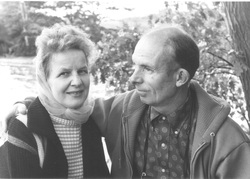 My grandparent’s home was a place of refuge for me as a child, and trips north to their family’s cottage at Houghton Lake brought much needed respite to my heart. I loved listening to stories of my grandma’s childhood which were unfortunately filled with tragedy. I must have found courage in her ability to survive those dark years. She was strong and opinionated and loved me deeply. She often said she loved me “more than the whole blue sky.”
My grandpa was good-humored and fun. He taught me to play Euchre, a card game I still love, and we played many games for nearly 40 years. He also taught me to fish, and we went out on his boat at Houghton Lake for hours of casting and sometimes catching fish. Though I’m vegetarian now, threading a worm on a hook and pulling a fish out of water thrilled me when I was young. After my family moved from Michigan to Massachusetts, my grandma came to visit, and one afternoon we lay side by side on my bed. She traced my face with her fingertips, over my forehead, and down the tip of my nose and chin. When I asked why, she said it was so she could remember me just as I was after she returned home. In that powerful moment I realized she missed me as deeply as I missed her. I feel a powerful connection to the movie Peggy Sue Got Married, especially the scenes when Peggy Sue goes back in time to visit her grandparents. I was incredibly blessed to have my grandparents until I was in my mid-forties. Even then, I did not want to let go. I still miss them both so much it takes my breath away. 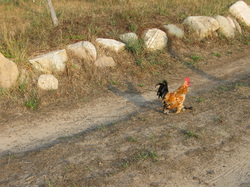 Why did the rooster cross the road so fast? He was booking it to the library! 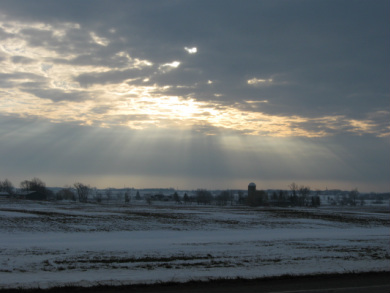 I live about half an hour from the small rural library where I work as a youth librarian. Audio books are my saving grace for the time I spend driving each day. Also, I strive to notice something of beauty every day on my drive. A view of my winter commute:
A few audio books I’ve particularly enjoyed (the actors reading the story make all the difference): End of Your Life Book Club by Will Schwalbe, Still Life with Bread Crumbs by Anna Quindlen, Revolution and A Northern Light by Jennifer Donnelly, Major Pettigrew’s Last Stand by Helen Simonson, Mennonite in a Little Black Dress and Does This Church Make Me Look Fat? by Rhoda Janzen, The Guernsey Literary and Potato Peel Pie Society by Mary Ann Shaffer and Annie Barrows, The Book Thief by Marcus Zusak.  John Corey Whaley. Thank you for writing another book. Noggin captured me from the first page, though I had to let go of my memories of reading Where Things Come Back and immerse myself in a completely different story. Where Things Come Back was the kind of story, when I finished, I went back to the beginning and read all over again. Other people have mentioned this in reviews, but so far I haven’t found anyone else having the same reason I had to read it again. Spoiler alert. When I read the end of Where Things Come Back, I wasn’t sure if the ending was happy or incredibly sad. Most people who read it seem to think it’s happy. Maybe that’s what Whaley intended. But there were clues along the way that could make the ending sad. When I re-read the book, I wrote all the clues down, studied them, and still didn’t know which way the ending went. That’s ok with me. I like being able to see it both ways.
Noggin is not happily ever after, either, but we have the feeling Travis will find his way. A truly gifted writer (Whaley certainly is one) resonates with lots of people in different ways. The most emotional scene for me in Noggin was when Travis held the hand of the little sister whose brother’s body was now Travis’s (you’ll have to read the book to understand what this is all about): I looked over at her and I swear I felt something I’ve never felt before. I felt like I knew this little kid, like I’d heard her voice before and felt her little hand in mine and seen her smile in the sunlight like that. It was so familiar to me, and despite being completely absurd and illogical, I knew in that moment that I was not just Travis Coates who died and came back from the dead. I was the older brother who she lost. (p.332) I experienced something mystical like this years ago when one of my daughter’s classmates lost her mother. One day at the high school parking lot while waiting to pick up my daughter, I saw this girl walking with her friends, and for a few moments I suddenly felt as if I was watching her through the eyes of her mother, as if her mother had taken over my eyesight to simply see her daughter being okay, being able to talk with friends, being able to laugh again. I could not turn away from watching this girl through the sensation of her mother’s eyes, and just as I was wondering if I should get out of the car and follow the girl, a feeling of relief came over me, of the mother letting go. Author Kate DiCamillo, in her 2014 Newbery medal acceptance speech, told of how, "[i]n the week after my mother died, I heard her say my name. It was just once, and I was asleep. The sound of her calling for me woke me up. Her voice was younger, impatient, certain, hopeful. It was the sound of her standing on the front porch steps, calling for me at dusk." Mystical experiences like these, our most real moments of life, are never forgotten. Artist Wanda Collins Johnson says, “Art is my way of keeping a record of the mystery of life…” In his book, Ten Poems to Last a Lifetime, Roger Housden says, "Moments like these pass, but they leave a trace on the air we breathe. I do not believe we are ever quite the same again, however transitory their visitations, however completely the everyday world seems to reassert itself (36)." John Corey Whaley. Thank you for keeping a record of the mystery of life. I hope you’re busy writing another book… 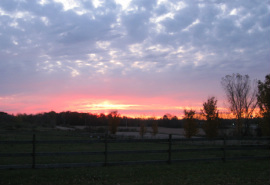 The 2014 Festival of Faith and Writing at Calvin College in Grand Rapids, Michigan, once again proved to be engaging and thought-provoking.
Some quote highlights: Write from a profound love of place… The story begins with place. William Kent Krueger Everything comes from place – weather, climate, who the people are, what happens, how people react. Julia Spencer Fleming We will learn as much, or more, from our failures as we ever will from our successes. Tap the deep roots of your own experience. William Kent Krueger In the midst of darkness, there is grace…there is part of you in every one of your characters, even the bad ones. Julia Spencer Fleming Everyone has the potential for good, but something happens along the way. William Kent Krueger “It is the business of writers as artists to write what haunts us…within the territory of belief.” Valerie Sayers What interests me? What surprises me? Pay attention – be attentive to every detail in describing something so someone else can see it. What kind of work do you want your writing to do in the world? Writing needs some provocative nature to it to be worthy of pursuing. Reflections from Christine Byl, Peter Marty, and John T. Price Advice is not meant to be taken; it’s meant to be considered. Otherwise, advice would be a command. Christine Byl Does a story rattle your soul? Why are certain stories retold? Why are there certain stories in your family that you tell over and over? Peter Orner Community is walking side by side with those who make us feel uncomfortable. Be biased in favor of community. Love as best we know how. Stories can provoke and provide powerful vulnerability. Part of empathy is acknowledging privilege – appreciate what you have. Try to understand everyone’s struggle. Embrace the stories of those with whom we disagree. Be gracious, compassionate, courageous. Stories interweave in sacred spaces. When you forget the people in the story, you have lost the story. Reflections from Jeff Chu |
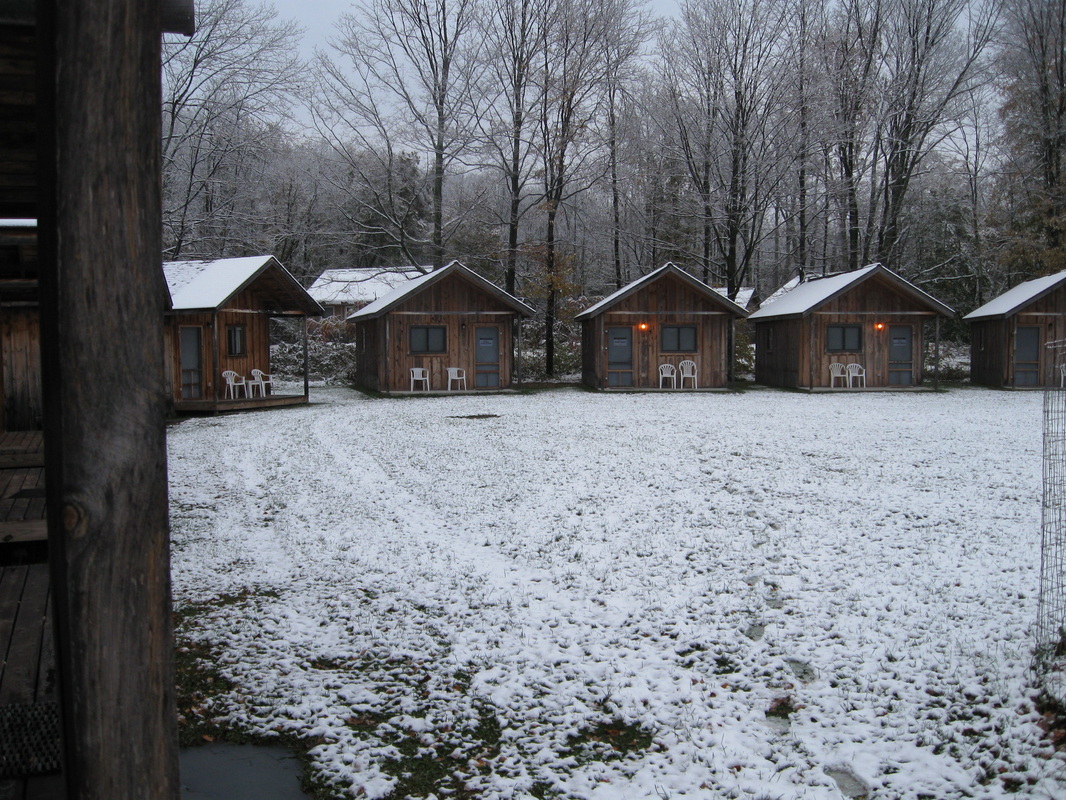


 RSS Feed
RSS Feed